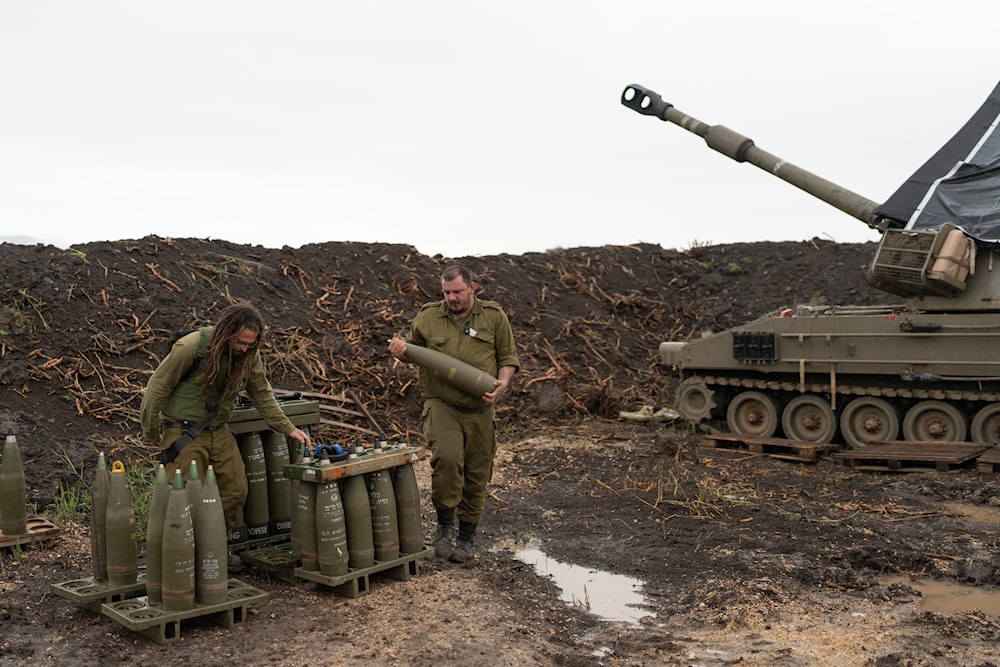Threat Hezbollah poses terrible, attacks taking place daily: JP
The Jerusalem Post reports that prior to October 7, the Israeli occupation would never have let Hezbollah launch 2,000 rockets and missiles at them without a large-scale war breaking out.
-

Israeli soldiers prepare to load a mobile howitzer in the north of occupied Palestine, near the occupied Lebanese-Palestinian border area, January 15, 2024 (AP)
The threat that Hezbollah poses to the Israeli occupation on the northern front is particularly emphasized by the Resistance movement launching hundreds of missiles and drones at "Israel" on a daily basis, with the latter allowing such attacks to become commonplace, said Seth Frantzman, analyst and the CEO of the Middle East Center for Reports and Analysis, said on Sunday in a Jerusalem Post report.
Frantzman affirmed that "the threat from Hezbollah is clear, and Israeli officials have often highlighted the importance of ending the threats posed by Hezbollah in the north."
The report mentioned that the Israeli occupation evacuated settlements along the northern border, relocating over 80,000 settlers to hotels and other areas, an action taken by the Israeli regime in response to Hezbollah launching dozens of anti-tank and anti-aircraft guided missiles, with over 2,000 rockets being launched toward occupied Palestine between October 8th and January 9th.
Hezbollah's operations led "Israel" to deploy three brigades along the borders and respond with offensive operations, the analyst said. After approximately 120 days, Frantzman observed that "the real question now is how can Hezbollah change its forces, whether its capabilities have been damaged, and how it can respond."
"The Hezbollah threat," he said, was always seen as much more serious than "the underestimated Hamas threat before October 7," noting that this may be due to the hilly terrain in northern occupied Palestine, which would not allow Hezbollah to launch a ground attack the way Hamas did in Operation al-Aqsa Flood.
Moreover, he noted that Hezbollah, before October 7, would never have been permitted to launch this absurd quantity of rockets and missiles toward "Israel" without an all-out war breaking out, though he highlighted that "Israel" is too occupied with Hamas and could not spread itself too thin to confront the threats on the northern front.
'Provocations' in the north
Frantzman described Hezbollah's actions on the northern front as aimed at testing the Israeli occupation's response and creating a new status quo, which included an increased drone threat against sensitive sites in the north.
Despite the large number of Israeli strikes in southern Lebanon, which they claim to be targeting Hezbollah infrastructure and the like while they in fact target residential homes, Frantzman pointed out that the overall impact the attacks have had on the Resistance movement is unclear.
The situation prompts speculation on whether a new version of the Cold War's "mutually assured destruction" doctrine is emerging, he underlined.
The Israeli occupation, even after it spent years attempting to undermine Hezbollah by attacking Syria, is facing diminishing returns and its losses are mounting.
As the war on Gaza reaches the four-month mark, the recent evacuations of settlements near Shlomi due to Hezbollah's operations underlines the severity of the situation for the Israeli occupation as it faces the difficult challenge of needing to regain control of the narrative and save face.
The resistance has been clear that the attacks were carried out in support of the steadfast Palestinian people in the Gaza Strip and in support of the Palestinian resistance.
Within this framework, the resistance in Lebanon has since October 8 been attacking Israeli military and reconnaissance sites, barracks, and assembly points along the border area with occupied Palestine.
Israeli reports disclosed that as of Thursday, around 512 settler housing units and structures suffered damage from Hezbollah's rockets since October 7th, with the extent of the damage ranging from partial to complete destruction.
Breaking down the details, Israeli media outlined that the impact affected 131 settler housing units in "Metulla," 43 settler housing units in "Kiryat Shmona," 121 homes in al-Manara, 9 settler housing units in al-Malkiya, 11 settler housing units in "Avivim," 25 settler housing units in "Zar'it", 37 settler housing units in "Shtula," 5 settler housing units in "Hanita," and 130 settler housing units in "Shlomi."
Similarly, Israeli media reported that 50 settler housing units were affected last Saturday following the use of Burkan-type rockets by Hezbollah.

 4 Min Read
4 Min Read








